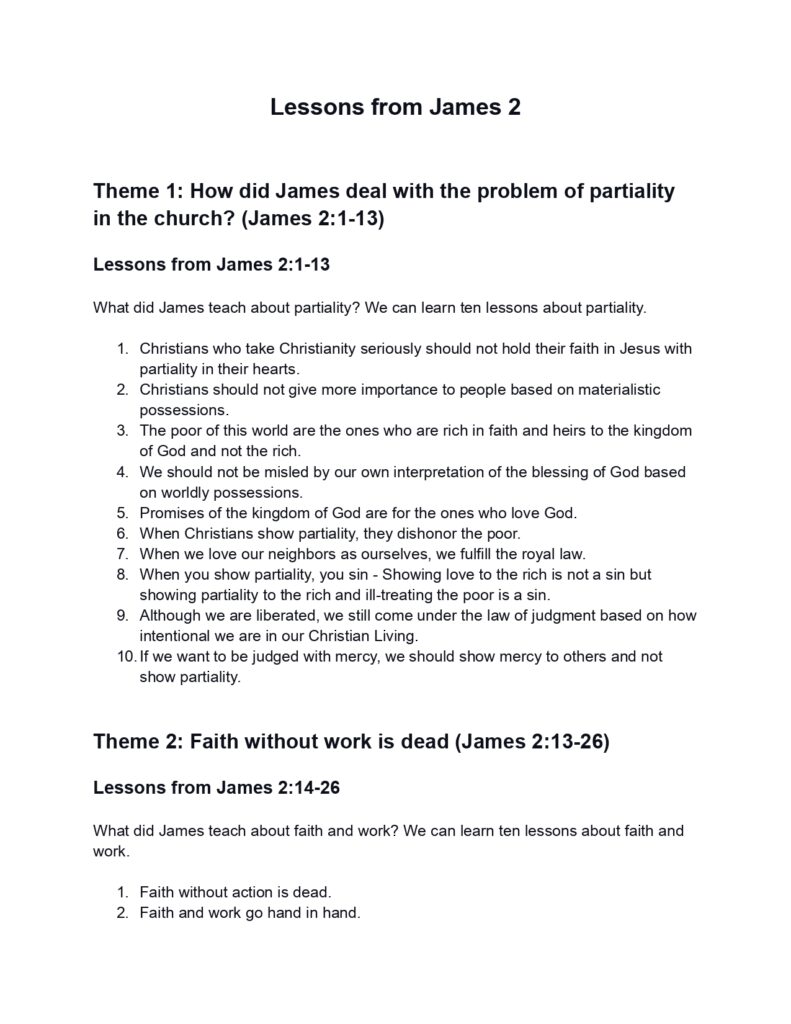
Commentary is a great way to elaborate and study the Bible in a way that unravels practical lessons to apply in our walk with Christ. This easy-to-understand James 2 Commentary with Bible Study questions plus FREE downloadable life lessons will explain James chapter 2 thoroughly.
You may consider this James chapter 2 commentary or James chapter 2 Bible Study.
What does the Bible say about James 2?
James 2 is considered a guide for Christian Living. This is because it addresses key elements of Christianity that are vital for spiritual growth.
Who wrote the Book of James? Who is speaking in James? It is believed that James, the half-brother of Jesus, wrote the book of James. Who is James talking to in the book of James? James wrote this book for the Jewish Christians struggling to keep their faith in action with the increasing persecution they faced under the Romans.
However, the teachings from the book of James can be applied by all Christians worldwide. It is helpful to every Christian who feels pressured by this world’s many demands and distractions.
What is the theme of James chapter 2?
What is the message in James 2? What is the main idea of James Chapter 2? James chapter 2 addresses the issue of partiality based on a person’s social status and explains how our faith should move us to act in alignment with the word of God.
James 2 can be divided into two main themes.
- How did James deal with the problem of partiality in the church? (James 2:1-13)
- Faith without work is dead (James 2:13-26)
Let’s discuss the two main themes of this Commentary and Bible Study in detail.
How did James deal with the problem of partiality in the church? (James 2:1-13 Commentary)
This section will explain what does the book of James teach about favoritism? It will address the issues of partiality, explain what being partial means, and explain what God thinks about partiality.
James chapter 2:1-13 explanation can be further divided into sub-sections:
- How does James say we should treat the rich and the poor? (James 2:1-4)
- What irony did James point out concerning the rich and powerful? (James 2:5-7)
- When you show partiality, you sin. (James 2:8-13)
a. James 2:1-4 Explanation – How does James say we should treat the rich and the poor?
James 2:1-4 (NKJV) – “1 My brethren, do not hold the faith of our Lord Jesus Christ, the Lord of glory, with partiality. 2 For if there should come into your assembly a man with gold rings, in fine apparel, and there should also come in a poor man in filthy clothes, 3 and you pay attention to the one wearing the fine clothes and say to him, “You sit here in a good place,” and say to the poor man, “You stand there,” or, “Sit here at my footstool,” 4 have you not shown partiality among yourselves, and become judges with evil thoughts?”
James starts chapter 2 by addressing the topic of partiality. James is speaking to all the Christians who take Christianity seriously and is cautioning them not to hold their faith in Jesus with partiality in their hearts.
James advises Christians not to judge people based on their outward appearance and attire. He says Christians should not give more importance to people based on materialistic things, like the clothes one wears and the kind of possessions one has.
There is much to learn from 1 Samuel 16:7. The NKJV says, “7 But the Lord said to Samuel, “Do not look at his appearance or his physical stature, because I have refused him. For the Lord does not see as man sees; man looks at the outward appearance, but the Lord looks at the heart.”
James poses a reflection question to the Christians, which explains partiality. James says that when Christians tell the rich to sit in a good place and tell the poor to sit at their footstool, it is apparent favoritism!
b. James 2:5-7 Explanation – What irony did James point out concerning the rich and powerful?
James 2:5-7 (NKJV) – “5 Listen, my beloved brethren: Has God not chosen the poor of this world to be rich in faith and heirs of the kingdom which He promised to those who love Him? 6 But you have dishonored the poor man. Do not the rich oppress you and drag you into the courts? 7 Do they not blaspheme that noble name by which you are called?”
The irony is that the rich of this world are not the ones who are rich in faith and heirs to the kingdom of God. Instead, the poor of this world are the ones who are rich in faith. They are the heirs to the kingdom of God.
In other words, James says that when we show partiality, we are misled by our own interpretation of what a real blessing in God’s sight really means! We think that people with more materialistic possessions are more blessed by God, so they must be more important.
But in verse 5, James rules out all such assumptions. James says that the promises of the kingdom of God are for the ones who love God. A person’s love for God determines how rich they are and not their materialistic possessions.
James further says in verse 6 that when Christians show partiality, they dishonor the poor. This is something that every Christian should be mindful of.
James points out that the rich of this world are so proud of the materialistic possessions that they drag the poor or vulnerable to court, speak lies about them, put all sorts of allegations on them and spoil their reputation. So how can Christians show favoritism to the ones who do that to the poor?
c. James 2:8-13 Explanation – When you show partiality, you sin.
James 2:8-13 (NKJV) – “8 If you really fulfill the royal law according to the Scripture, “You shall love your neighbor as yourself,” you do well; 9 but if you show partiality, you commit sin, and are convicted by the law as transgressors. 10 For whoever shall keep the whole law, and yet stumble in one point, he is guilty of all. 11 For He who said, “Do not commit adultery,” also said, “Do not murder.” Now if you do not commit adultery, but you do murder, you have become a transgressor of the law. 12 So speak and so do as those who will be judged by the law of liberty. 13 For judgment is without mercy to the one who has shown no mercy. Mercy triumphs over judgment.”
In verse 8, James explains that when we love our neighbors as ourselves, we are fulfilling the royal law. Christians are called to love God and love people. So loving people is good! We are to show love to everyone, rich and poor!
According to verse 9, showing love to the rich is not a sin, but showing partiality to the rich and ill-treating the poor is!
James points out that dishonoring someone by showing any partiality; it may be based on their materialistic possessions, social status, worldly success, worldly achievements, race, or skin color – is a sin according to the royal law.
In verse 10, James explains that even if a Christian keeps the whole law but stumbles in one thing is guilty of all. In verse 11, James gives examples to explain it further. Christians need to understand that God gives a lot of emphasis on the attitudes of our hearts.
James’ cautions are not to scare us but to remind us that we need to be intentional in our Christain Living.
In verse 12, James explains the law of liberty. What is the law of liberty in the Bible? It may feel strange that the law and liberty are tagged together. We may think, what has law got to do with liberty? Or how can law and freedom go together? Aren’t they opposed to each other?
Liberty means freedom. Because of Jesus, Christians are not under the law of Moses. Jesus only gave us two laws to live by, which include everything!
- Love God
- Love People
Because of Jesus, we are free from eternal death. We are liberated and redeemed! However, from verse 13, we learn that how much mercy we show others, we will be judged by the same measure of mercy.
Although we are liberated, we still come under the law of judgment based on how intentional we are in our Christian Living. Accepting Jesus does not give us a license to sin and live however we want.
In fact, after accepting Jesus, we need to be more careful about how we lead life. Christians should show mercy to others and not show partiality. If we want to be judged with mercy, we should show mercy to others on this earth.
Matthew 7:2 NKJV says, “For with what judgment you judge, you will be judged; and with the measure you use, it will be measured back to you.”
Lessons from James 2:1-13
What did James teach about partiality? We can learn ten lessons about partiality.
- Christians who take Christianity seriously should not hold their faith in Jesus with partiality in their hearts.
- Christians should not give more importance to people based on materialistic possessions.
- The poor of this world are the ones who are rich in faith and heirs to the kingdom of God and not the rich.
- We should not be misled by our own interpretation of the blessing of God based on worldly possessions.
- Promises of the kingdom of God are for the ones who love God.
- When Christians show partiality, they dishonor the poor.
- When we love our neighbors as ourselves, we fulfill the royal law.
- When you show partiality, you sin – Showing love to the rich is not a sin but showing partiality to the rich and ill-treating the poor is a sin.
- Although we are liberated, we still come under the law of judgment based on how intentional we are in our Christian Living.
- If we want to be judged with mercy, we should show mercy to others and not show partiality.
If you want questions for reflection, you can download bible study on James 2 1-13.
Faith without work is dead (James 2:14-26 Commentary)
James 2:14-26 can be explained as introspection of our faith. James explains the importance of our work to align our faith.
Let’s discuss each verse in detail.
James 2:14 (NKJV) -” What does it profit, my brethren, if someone says he has faith but does not have works? Can faith save him?”
In verse 14, James asks the Jewish Christians if there was any profit for having faith but no works. He asks this million-dollar question! Can ONLY faith save? Many such questions must have passed through your mind at some point.
First, let’s answer this question, what is saving faith? Ephesians 2:8-9 NKJV, “For by grace you have been saved through faith and that not of yourselves; it is the gift of God, not of works, lest anyone should boast.”
Salvation is a free gift from God that can only be received with faith and not works. No matter what you do or how many good works you have backing you up, you cannot be saved ONLY with your work. So, is justification by faith alone? Justification of our past sins? Yes!
In that case, is faith alone in the Bible? Is James disputing the salvation message? No! Faith is not alone in the Bible. We need to understand that James is not contradicting the salvation message.
Then, what does the Bible say about faith and work? James explains this beautifully. James means that when we receive the gift of salvation through faith, our works will always back the new person we become after being saved. Our lifestyle and what we do on this earth will always be a byproduct that will follow our faith in Christ.
James explains this with an example in verses 15-16. 15 If a brother or sister is naked and destitute of daily food, 16 and one of you says to them, “Depart in peace, be warmed and filled,” but you do not give them the things which are needed for the body, what does it profit?
James asks, what good is it to say keep warm? He is right! As Christians, isn’t it our responsibility to give some food and clothes to the brother or sister in need? We all know this, and so did the Jewish Christians of the early church. This issue of not taking the step forward to help other Christians has been an issue since early times.
One example is Barnabas from the early church, who gave away his wealth for the church, and many others did nothing. Instead, they just gave good wishes. James says this in continuation with dealing with the issue of partiality, which means that not only were the Christians not helping, but they were also showing partiality based on materialistic possessions.
James calls this kind of faith “dead faith.”
What does dead faith mean?
James 2:17 (NKJV) – “17 Thus also faith by itself, if it does not have works, is dead.”
What is the meaning of James 2 17? James again reinforced the importance of work to be a byproduct of faith. Just saying that we live by faith without our works/lifestyle backing up our faith; it means living a dead life!
What does the Bible say about faith without work?
James 2:18-20 (NKJV)– “18 But someone will say, “You have faith, and I have works.” Show me your faith without your works, and I will show you my faith by my works. 19 You believe that there is one God. You do well. Even the demons believe—and tremble! 20 But do you want to know, O foolish man, that faith without works is dead?”
James clarifies in verse 18 that faith and work go hand in hand. He uses the example of demons in verse 19. James explains that faith is all about believing in God and that he can save us. James says even demons believe the same.
In that case, what is the difference between demons and Christians? Even after knowing that only Christ saves, Demons still do all sorts of bad things. If Christians know and believe that Christ saves but go on to live the life they previously lived before accepting Christ or don’t live a life that aligns with the word of God, then what good is their faith?
In verse 20, James reinforces that faith without work is dead! Living a life that does not back your faith is a dead life.
Then, how do you live out your faith? James explains this using examples of some great heroes from the Bible.
James 2:21-26 (NKJV) – “21 Was not Abraham our father justified by works when he offered Isaac his son on the altar? 22 Do you see that faith was working together with his works, and by works, faith was made perfect? 23 And the Scripture was fulfilled, which says, “Abraham believed God, and it was accounted to him for righteousness.” And he was called the friend of God. 24 You see then that a man is justified by works, and not by faith only. 25 Likewise, was not Rahab the harlot also justified by works when she received the messengers and sent them out another way? 26 For as the body without the spirit is dead, so faith without works is dead also.”
What makes a person of faith? From the examples James gave of Abraham and Rahab, we understand that a person of faith justifies their faith with their works.
What does justified by works mean? James points out in verses 21, 23, and 25 that Abraham and Rahab were justified by works and not just faith. For example, Abraham offered Issac at the altar even after knowing that Issac was his promised child.
Rahab, although a harlot and had no reputation in society, Rahab received the people of God and helped them escape. James says that when someone has faith, they will definitely act in alignment with their faith and not like someone without faith.
What does it mean to be without faith? From the examples of Abraham and Rahab, we can learn that it is not enough just to say that we live by faith when our actions do not align with what we proclaim we believe. If our actions do not align with our faith, then James says that we do not actually have faith and our faith is powerless.
What is the power of faith? Faith has the power to move us to action; that is the bottom line! It is important to introspect on your life and reflect on your actions. Did faith move you to act in alignment with the word of God? For the answer to be a YES! You should be able to have the same answer to the following questions
- What does faith mean in your daily life? – Taking action in alignment with the word of God
- How can you show faith in God every day? – By taking action in alignment with the word of God.
- How do you keep your faith in God strong? – By taking action in alignment with the word of God.
Lessons from James 2:14-26
What did James teach about faith and work?
- Faith without action is dead.
- Faith and work go hand in hand.
- If our faith does not have the power to move us to action, our faith is dead.
- When Christians are justified by faith, their actions will align with the word of God.
If you want questions for reflection, you can download bible study on James 2 14-26.

James 2 Bible Study Tools
If you want all the James 2 Bible Study Questions based on the Commentary above, you can download James 2 bible study pdf.

If you want all the lessons from James 2, you can download lessons from James 2 pdf.
If you are interested in James 2 bible study guide, then you can get the following helpful James 2 bible study tools.
James 2 Commentary Spurgeon – Commentary on James (Spurgeon Commentary Series)
James 2 Commentary John Macarthur – James: Guidelines for a Happy Christian Life
Also, be sure to read the following:
- James 1 Commentary Bible Study: Enduring Trials through Patience and Visiting the Orphans and Widows.
- James 3 Commentary Bible Study: Taming the Tongue with Heavenly Wisdom
- James 4 Commentary Bible Study: Encouraging Christians Not to Live in Strife with Other Christians.
- James 5 Commentary Bible Study: Cautioning Christians not to run after riches but to run after God and to love people by serving them.







